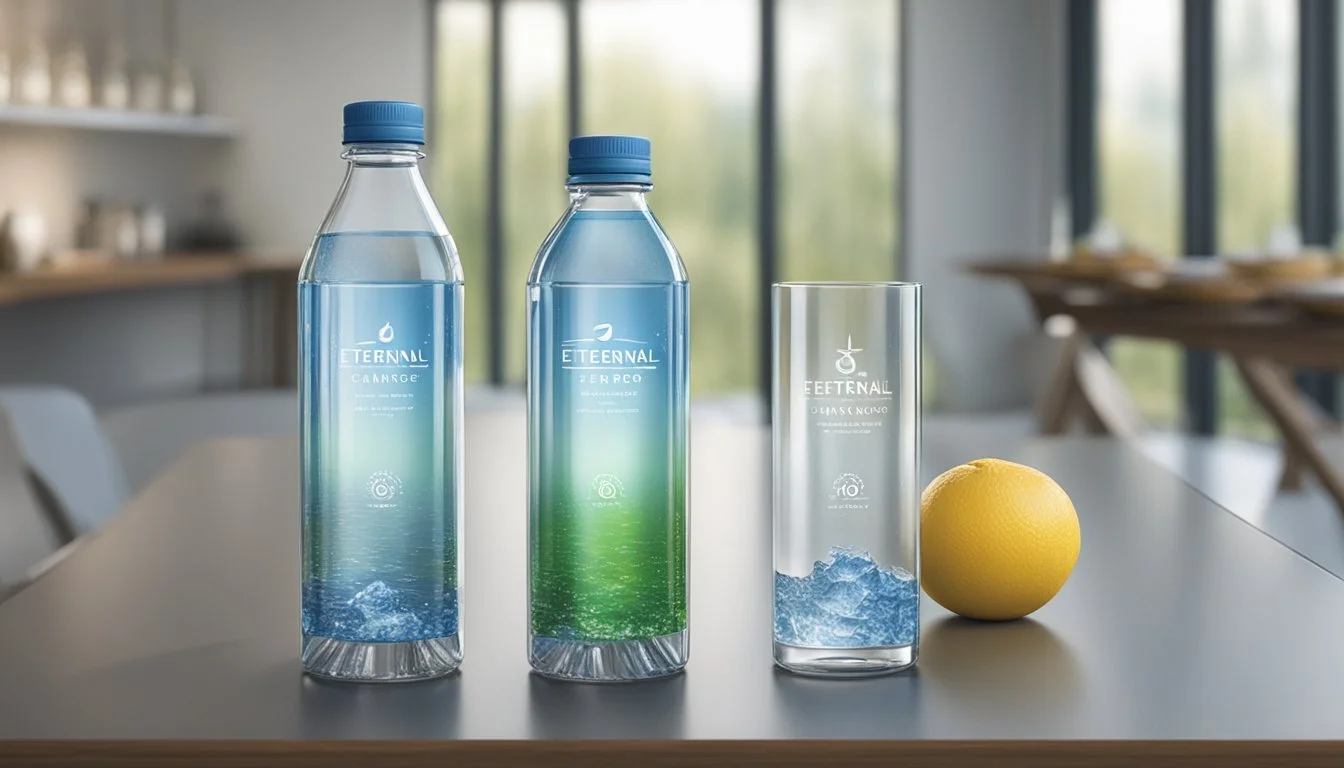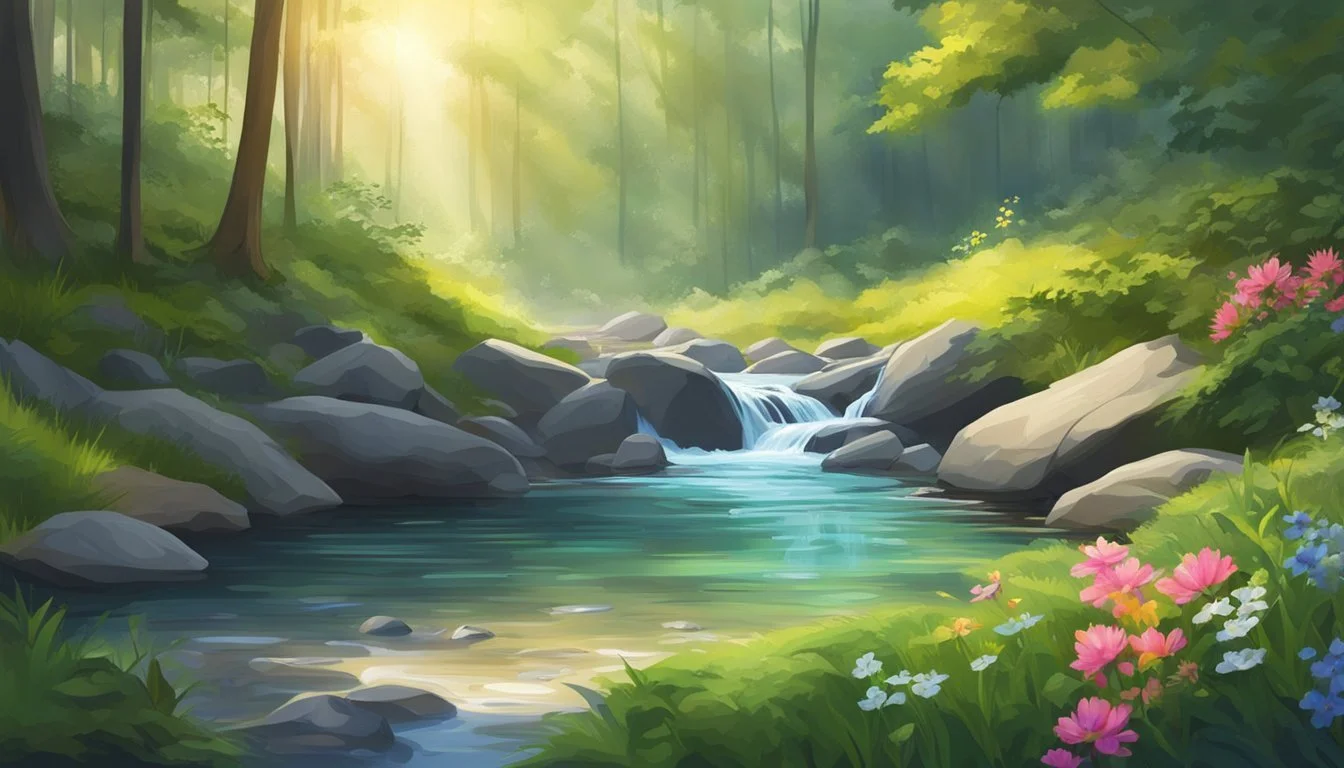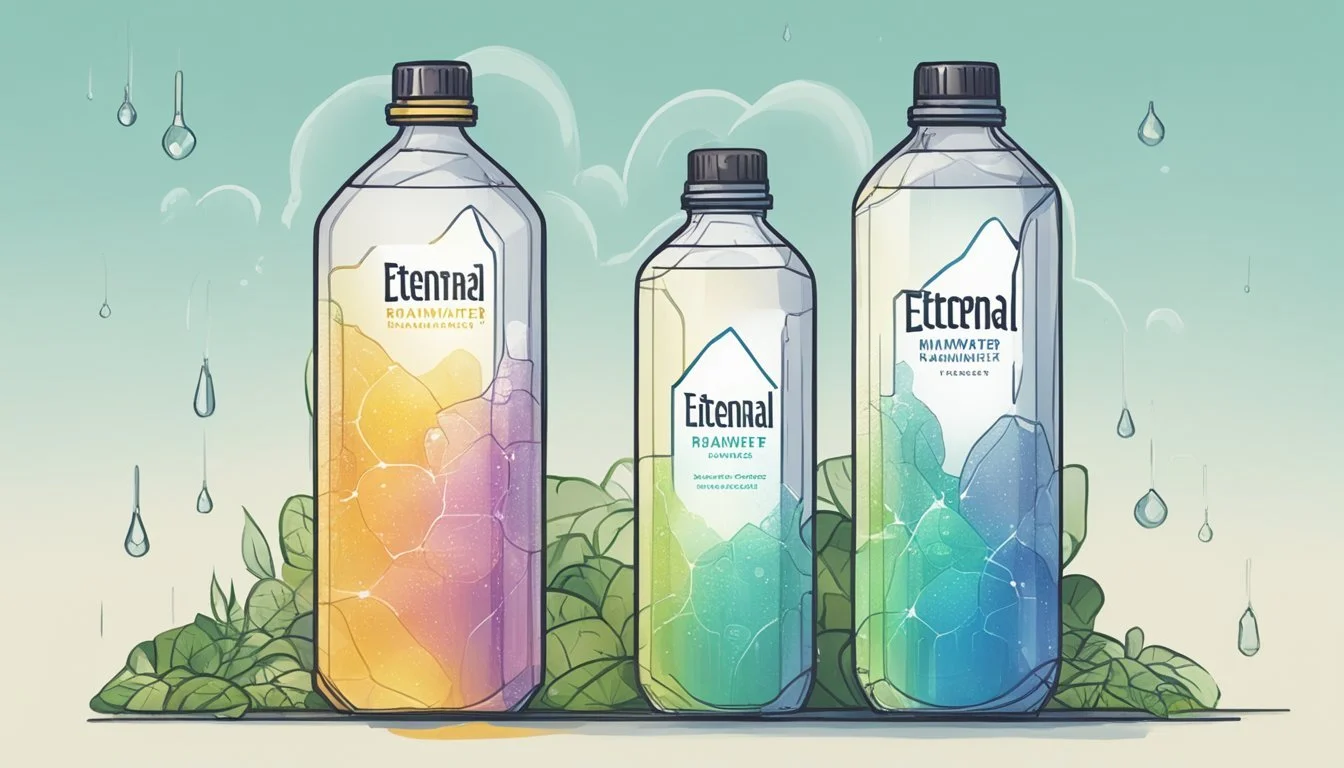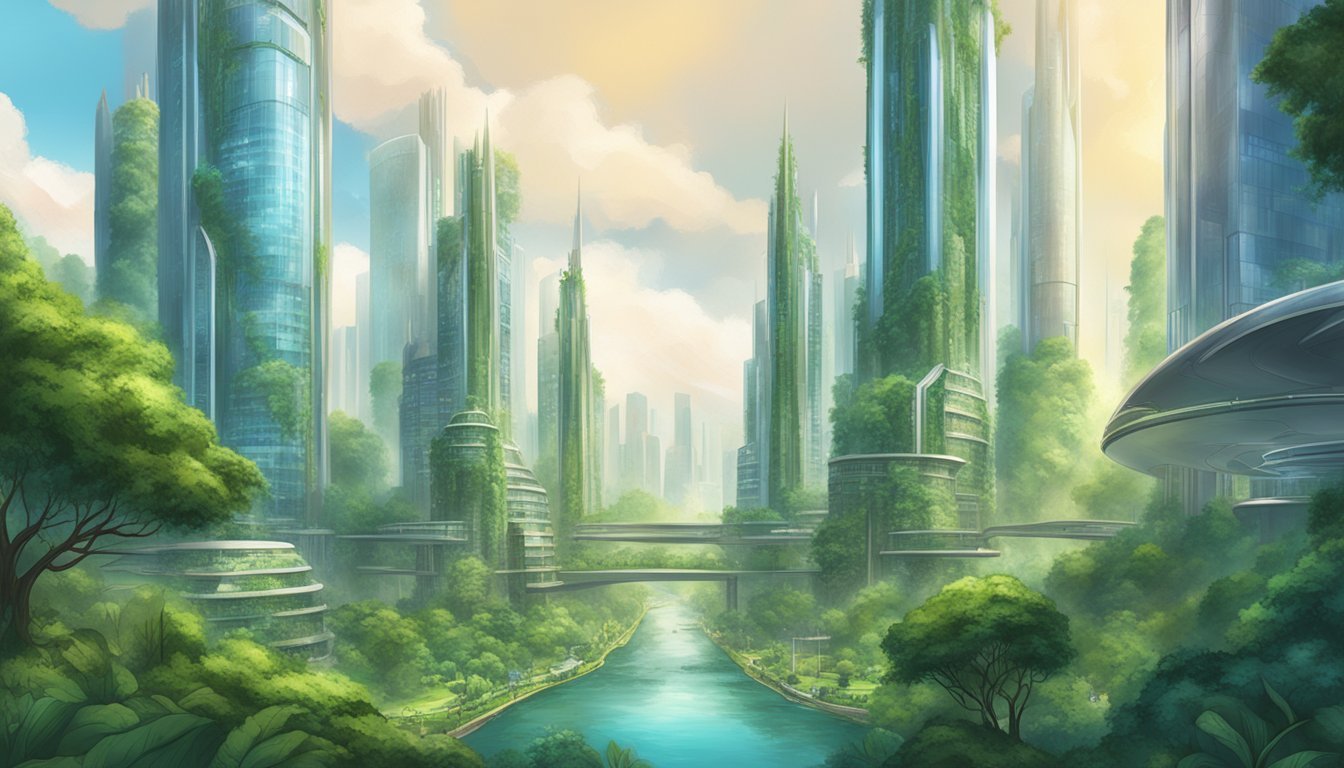Eternal vs. Richard’s Rainwater
Which Bottled Water is Better? A Clear Comparison
Choosing the right bottled water can make a noticeable difference in both taste and quality, which is why Eternal Water and Richard’s Rainwater offer two distinct options worth comparing. Eternal Water Nutrlay boasts a pH of 9.5 or higher, ensuring a highly alkaline product that promises purity through advanced filtration methods. This makes it ideal for those seeking hydration with added electrolytes for an extra boost.
Richard’s Rainwater, on the other hand, offers a unique approach by capturing natural rainwater, promising a pure and refreshing taste that closely mimics catching raindrops on your tongue. This method provides a different kind of appeal, catering to those who appreciate an eco-friendly and natural source of drinking water.
The choice ultimately depends on what you value more in your bottled water. While Eternal Water offers consistency and added electrolytes, Richard’s Rainwater delivers a naturally sourced option that prides itself on minimal processing. Both present compelling reasons to be considered the better choice in different contexts.
Understanding Bottled Water
Bottled water comes in various types and must adhere to stringent regulations to ensure safety and quality.
Sources and Types of Bottled Water
Bottled water can originate from multiple sources, such as springs, groundwater, and municipal water supplies. For instance, spring water is collected directly from natural springs, usually through a borehole or a spring structure. Groundwater is sourced from underground aquifers, making it free from surface contamination. Municipal water, on the other hand, is treated tap water which undergoes additional filtration and purification processes before bottling.
Types of bottled water are categorized based on their sources and treatment processes:
Spring Water: Directly collected from a spring.
Purified Water: Produced through processes like reverse osmosis, distillation, or deionization.
Mineral Water: Contains a specific amount of naturally occurring minerals.
Sparkling Water: Naturally carbonated from the source or artificially carbonated.
Knowing the source and type helps consumers make informed choices.
Bottled Water Standards and Regulations
Bottled water must comply with stringent standards and regulations to ensure safety and quality. In the United States, the Food and Drug Administration (FDA) regulates bottled water, enforcing standards that are as stringent as those set by the Environmental Protection Agency (EPA) for tap water.
Water quality is monitored for contaminants like bacteria, heavy metals, and chemicals. Bottled water can have treatments such as micro-filtration, reverse osmosis, and ultraviolet light exposure to ensure purity. For example, Richard's Rainwater captures and purifies rain before it hits the ground, minimizing the need for additives like chlorine or fluoride.
Labels must accurately represent the type of water and any added treatments or minerals. Consumers can look for certifications and quality seals to ensure they are choosing a product that meets high standards.
What Is Richard’s Rainwater?
Richard's Rainwater revolutionizes the bottled water industry by harvesting and bottling potable rainwater. The company's sustainability initiatives and unique closed-loop filtration system set it apart from conventional water sources.
The Story of Richard Heinichen and the Brand
Richard Heinichen founded Richard’s Rainwater in the 1990s out of frustration with the quality of well water in Austin, Texas. Heinichen began collecting rainwater for personal use and soon recognized its potential for broader application.
He transformed this initiative into a business, now known as Richard’s Rainwater, which sells both still and sparkling rainwater. Heinichen's innovative approach and dedication to sustainability have made the brand a pioneer in rainwater bottling.
Rainwater Collection and Bottling Process
Richard’s Rainwater collects rainwater from dedicated sites across the U.S. Each collection site is equipped with state-of-the-art rain capture facilities that gather millions of gallons of water.
The captured rainwater undergoes a proprietary, zero-waste filtration process which ensures that almost no water is lost. This process purifies the rainwater to make it 100% potable and packages it in infinitely recyclable bottles and cans, promoting environmental sustainability.
Unique Selling Propositions of Richard’s Rainwater
Sustainability: Richard’s Rainwater employs a closed-loop system that minimizes waste and maximizes resource use. This method makes more water available for drinking than traditional sources.
Purity and Taste: The collected rainwater is known for its clean and smooth taste, often described as almost sweet. The filtration process retains the purity of the rainwater, ensuring high-quality hydration.
Packaging: The use of recyclable aluminum cans and glass bottles reflects the company's commitment to reducing plastic waste. This eco-friendly approach enhances its credibility in the market.
Richard’s Rainwater offers a compelling alternative to conventional bottled water brands by focusing on sustainability, purity, and innovative water collection methods.
Eternal Water: A Deep Dive
Eternal Water boasts pristine quality, sourced from protected underground springs, and is renowned for its premium natural minerals and superior hydration properties.
The Journey of Eternal Water
Eternal Water originates from natural springs, specifically selected for their high-quality water sources. These springs are safeguarded to maintain the purity and natural quality of the water. Such protection ensures the water remains untouched by environmental contaminants commonly found in tap water or less protected sources.
The sourcing process emphasizes sustainability. Eternal Water is derived from renewable spring sources, avoiding depletion risks. Unlike some bottled waters, it aims to provide a consistent, clean water experience without exploiting the ecosystem.
Natural Filtration and the Purity of the Source
Eternal Water undergoes a natural filtration process as it travels through layers of rock, rich in minerals like calcium, potassium, and magnesium. This filtration enhances its purity and taste without requiring additional chemical treatments typical of tap water purification.
The natural mineral content not only contributes to a refreshing taste but also provides essential electrolytes for the body. The emphasis on natural filtration ensures a consistent, high-quality product, devoid of pollutants and contaminants often associated with less rigorously sourced bottled waters.
In contrast to some processed water brands, Eternal Water retains its original mineral composition, leveraging the Earth's natural filtering capabilities. This commitment to natural purity distinguishes it from alternatives that rely heavily on industrial purification methods.
Environmental Impact and Sustainability
Both Eternal and Richard’s Rainwater emphasize sustainability and environmental impact, but their approaches to packaging, carbon footprint, and water conservation differentiate them.
Packaging and Recycling Initiatives
Eternal uses PET plastic for its bottles, which are recyclable but still pose environmental challenges. In contrast, Richard’s Rainwater opts for aluminum cans and glass bottles. These materials are more easily and efficiently recycled compared to plastic.
Richard's use of refillable glass bottles aligns with zero-waste principles. The shift away from single-use plastics helps reduce landfill waste and encourages a circular economy.
Assessing the Carbon Footprint of Bottled Water
The carbon footprint of bottled water includes production, transportation, and disposal. Eternal relies heavily on PET plastic, which has a significant carbon footprint due to fossil fuel-derived materials.
Richard’s Rainwater, however, collects and filters rainwater, reducing reliance on municipal sources with higher carbon footprints. The use of local bottling facilities also minimizes transportation emissions and supports a lower carbon footprint.
Renewable Practices and Water Conservation
Eternal’s water sources require extensive processing, which involves substantial energy use and water waste. In contrast, Richard’s Rainwater employs renewable practices; it harvests rainwater, filtering it through a virtually zero-waste system. This method conserves water and reduces resource extraction impacts.
By collaborating with EcoRise, Richard’s Rainwater fosters community education on sustainability and promotes water conservation. The emphasis on renewable water collection and reduced energy use positions Richard’s Rainwater as a leader in sustainable bottled water practices.
Health and Safety Considerations
Consumers often prioritize the health and safety aspects of their bottled water choices. Key factors include the purity of the water and the potential presence of chemical additives.
Analyzing Water Purity and Safety
Eternal Water is known for sourcing its water from protected underground springs, offering natural minerals such as calcium, potassium, and magnesium. These minerals help meet nutritional needs while ensuring the water remains pure. The rigorous purification process involved aims to maintain high-quality drinking water standards.
Richard’s Rainwater collects and purifies rainwater, emphasizing natural water collection. The purification system ensures the removal of contaminants and meets safety regulations. The approach to water collection minimizes risks associated with common contaminants found in other bottled water brands.
Chemical Additives in Municipal Water vs. Bottled Water
Municipal water supplies often contain additives like chlorine, fluoride, and ammonia to ensure pathogens are eradicated, but these chemicals can have varying health impacts. Lead contamination, often from old pipes, poses significant health risks.
Eternal Water avoids these chemicals due to its natural spring origins. Similarly, Richard’s Rainwater benefits from rainwater's initial purity, further enhanced by its purification process. By choosing these bottled waters, consumers can avoid the chemical additives typically found in municipal sources, ensuring they consume cleaner and safer water.
Comparison of Eternal and Richard’s Rainwater
Eternal and Richard’s Rainwater each bring unique features to the bottled water market, offering distinct flavors, pricing strategies, and retail availability. Here's a closer look at how they compare in these crucial areas.
Tasting Notes: Still Water and Sparkling Variants
Eternal offers natural spring water renowned for its smooth taste and balanced minerals. The brand does not provide a sparkling water option. Richard’s Rainwater, on the other hand, collects rainwater and filters it to create pure, clean-tasting still water and sparkling rainwater variants.
The sparkling rainwater has a crisp, refreshing flavor that appeals to those looking for a carbonated option. Consumers can expect a pure, neutral taste from both brands, with Richard’s Rainwater adding an effervescent twist for their sparkling variant.
Pricing and Accessibility for Consumers
Eternal water tends to be priced at a premium due to its source and branding, generally appearing at about $1.50 to $2.50 per bottle. Consumers can find Eternal in major retailers such as Kroger, Whole Foods Market, and Amazon.
Richard’s Rainwater, leveraging its innovative collection method, maintains competitive pricing, often around $1.00 to $2.00 per bottle. Availability includes regional retailers like HEB and Central Market, alongside national chains like Whole Foods Market and Sprouts.
Brand Presence in Retail and Grocery Stores
Eternal is well-established in the bottled water market, with widespread distribution in both physical and online stores. It enjoys a strong presence in Whole Foods Market, Kroger, and Amazon, making it easily accessible to a broad consumer base.
Richard’s Rainwater has been expanding rapidly, recording significant sales growth. The brand is found in a variety of retailers, including Whole Foods Market, Sprouts, Central Market, and HEB, showing its increasing penetration.
Both brands have distinct distribution strengths, making it convenient for consumers to find and purchase their preferred products.
Collaborations and Community Engagement
Both Eternal and Richard's Rainwater actively engage in meaningful collaborations and community projects that enhance their brand value and commitment to sustainability.
Strategic Partnerships and Co-Branding Initiatives
Richard’s Rainwater has established notable partnerships to expand its reach and impact. One significant collaboration is with Faubourg Brewing Co under the umbrella of Made by the Water. This partnership aims to distribute Richard's Rainwater alongside other artisanal beverages, leveraging shared resources to maximize distribution efficiency and impact.
Eternal, meanwhile, often collaborates with organizations promoting wellness and health, aligning its brand with a holistic lifestyle. They have formed partnerships with retail giants such as Albertsons and Nestlé to ensure their products are widely accessible. These strategic partnerships not only expand their market presence but also enhance brand credibility.
Supporting Local Communities and Projects
Richard’s Rainwater emphasizes community engagement through sustainable water practices. By collecting and purifying rainwater, they reduce reliance on municipal sources. Their community-centric approach is exemplified by initiatives that support local projects aimed at water conservation and sustainability.
The Director of Sustainability at Richard’s Rainwater drives these efforts, ensuring measurable impact in the regions they operate.
Eternal engages in various local community projects, often sponsoring events related to health and fitness. They support community centers and schools by providing bottled water and educational resources about hydration and wellness. These efforts showcase their commitment to fostering strong community relations and promoting public health.
Consumer Insights and Market Trends
Consumers today are increasingly discerning about the bottled water they choose, evaluating factors like source, purity, and sustainability. Brands such as Eternal and Richard’s Rainwater are directly responding to and shaping these preferences.
Understanding Consumer Preferences
Consumers prioritize water source and purity above all. Eternal water, sourced from natural springs, and Richard’s Rainwater, harvested from rain, cater to this preference effectively.
Sustainable practices attract eco-conscious buyers. Richard’s Rainwater’s zero-waste bottling process stands out, driving consumer interest and brand loyalty.
Retailers and bottlers leverage these preferences in marketing and product placement, emphasizing premium and sustainable credentials to differentiate their products.
The Growth Trajectory of Bottled Water Brands
The bottled water market is expanding, driven by rising health and wellness trends. Brands like Eternal and Richard’s Rainwater report significant sales growth.
Richard’s Rainwater is notable for its innovative collection methods, projecting to harvest over 4 million gallons in 2023, translating into $10 million+ in sales.
Labels and branding play key roles, with both brands investing in distinct, eye-catching packaging that communicates purity and environmental benefits.
The market trends underscore a shift toward premiumization and environmental responsibility, with Eternal and Richard’s Rainwater well-positioned to capitalize.
The Future of Bottled Water
The bottled water industry is rapidly evolving with new technologies and increased awareness of environmental issues. The focus is on enhancing sustainability and innovating purification methods.
Innovations in Bottling and Water Purification
Recent technological advancements have led to improvements in bottling processes and water purification methods. Richard's Rainwater highlights how rainwater can be collected and purified with minimal waste. This system ensures high levels of purity and increases the available drinking water.
Eternal Water similarly emphasizes its natural filtration process, which involves sourcing water from alkaline springs. Such methods ensure that the water maintains its natural mineral content. Innovations in this field include micro-filtration, UV exposure, and reverse osmosis, all aiming to provide cleaner and healthier bottled water.
The Potential Impact of Rising Environmental Concerns
Environmental concerns are driving the future of bottled water. The industry is shifting towards more sustainable practices. Both Richard's Rainwater and Eternal Water aim to reduce their environmental footprint by utilizing recyclable materials and efficient resource management.
Consumers are increasingly demanding eco-friendly products, pushing companies to adopt more sustainable bottling practices. Innovations in biodegradable packaging and the use of renewable resources are becoming more common. As a result, the industry is likely to continue evolving with a strong focus on sustainability and reducing the impact on the planet.
More About Eternal
Eternal vs Icelandic Glacial: Which Bottled Water is Better?
Eternal vs Kirkland Signature: Which Bottled Water is Better?
Eternal vs Mountain Valley Spring Water: Which Bottled Water is Better?
Eternal vs Whole Foods Italian Still Mineral water: Which Bottled Water is Better?
More About Richard’s Rainwater
Acqua Pana vs Richard's Rainwater: Which Bottled Water is Better?
Alkaline88 vs Richard's Rainwater: Which Bottled Water is Better?
Antipodes vs Richard's Rainwater: Which Bottled Water is Better?
Aqua Carpatica vs Richard's Rainwater: Which Bottled Water is Better?
Aquafina vs Richard's Rainwater: Which Bottled Water is Better?
Arrowhead vs Richard's Rainwater: Which Bottled Water is Better?
Boxed Water vs Richard's Rainwater: Which Bottled Water is Better?
Cascade Mountain vs Richard's Rainwater: Which Bottled Water is Better?
Castle Rock vs Richard's Rainwater: Which Bottled Water is Better?
Cirro vs Richard's Rainwater: Which Bottled Water is Better?
Richard's Rainwater vs HFactor: Which Bottled Water is Better?
Core Hydration vs Richard's Rainwater: Which Bottled Water is Better?
Crystal Geyser vs Richard's Rainwater: Which Bottled Water is Better?
Deer Park vs Richard's Rainwater: Which Bottled Water is Better?
Erewhon vs Richard's Rainwater: Which Bottled Water is Better?
Essentia vs Richard's Rainwater: Which Bottled Water is Better?
Ethos vs Richard's Rainwater: Which Bottled Water is Better?
Evian vs Richard's Rainwater: Which Bottled Water is Better?
Hawaii Volcanic vs Richard's Rainwater: Which Bottled Water is Better?
Hawaiian Springs vs Richard's Rainwater: Which Bottled Water is Better?
Ice Mountain vs Richard's Rainwater: Which Bottled Water is Better?
Icelandic Glacial vs Richard's Rainwater: Which Bottled Water is Better?
Just Water vs Richard's Rainwater: Which Bottled Water is Better?
Kroger vs Richard's Rainwater: Which Bottled Water is Better?
LIFEWTR vs Richard's Rainwater: Which Bottled Water is Better?
Liquid Death vs Richard's Rainwater: Which Bottled Water is Better?
Mananalu vs Richard's Rainwater: Which Bottled Water is Better?
Mountain Valley Spring Water vs Richard's Rainwater: Which Bottled Water is Better?
Nestle Pure Life vs Richard's Rainwater: Which Bottled Water is Better?
Origin vs Richard's Rainwater: Which Bottled Water is Better?
Ozarka vs Richard's Rainwater: Which Bottled Water is Better?
Penta vs Richard's Rainwater: Which Bottled Water is Better?
Perrier vs Richard's Rainwater: Which Bottled Water is Better?
Poland Spring vs Richard's Rainwater: Which Bottled Water is Better?
Purely Sedona vs Richard's Rainwater: Which Bottled Water is Better?
Richard's Rainwater vs 1907water: Which Bottled Water is Better?
Richard's Rainwater vs 7-Select: Which Bottled Water is Better?
Richard's Rainwater vs Action: Which Bottled Water is Better?
Richard's Rainwater vs Big Chill: Which Bottled Water is Better?
Richard's Rainwater vs Big Win: Which Bottled Water is Better?
Richard's Rainwater vs BodyArmor: Which Bottled Water is Better?
Richard's Rainwater vs CBD Living: Which Bottled Water is Better?
Richard's Rainwater vs Crystal Lake: Which Bottled Water is Better?
Richard's Rainwater vs Dasani: Which Bottled Water is Better?
Richard's Rainwater vs Essence pH10: Which Bottled Water is Better?
Richard's Rainwater vs Kirkland Signature: Which Bottled Water is Better?
Richard's Rainwater vs Open Water: Which Bottled Water is Better?
Richard's Rainwater vs Ophora: Which Bottled Water is Better?
Richard's Rainwater vs Proud Source: Which Bottled Water is Better?
Richard's Rainwater vs Pure Life: Which Bottled Water is Better?
Richard's Rainwater vs Ramona: Which Bottled Water is Better?
Richard's Rainwater vs Refreshe: Which Bottled Water is Better?
Richard's Rainwater vs Simple Truth: Which Bottled Water is Better?
Richard's Rainwater vs Skyra: Which Bottled Water is Better?
Richard's Rainwater vs Talking Rain AQA: Which Bottled Water is Better?
Richard's Rainwater vs The Well: Which Bottled Water is Better?
Richard's Rainwater vs Weird Water: Which Bottled Water is Better?
Richard's Rainwater vs Whole Foods 365: Which Bottled Water is Better?
Richard's Rainwater vs Zenwtr: Which Bottled Water is Better?
San Pellegrino vs Richard's Rainwater: Which Bottled Water is Better?
Smartwater vs Richard's Rainwater: Which Bottled Water is Better?
Solan de Cabras vs Richard's Rainwater: Which Bottled Water is Better?
Starkey vs Richard's Rainwater: Which Bottled Water is Better?
Tahoe vs Richard's Rainwater: Which Bottled Water is Better?
Topo Chico vs Richard's Rainwater: Which Bottled Water is Better?
Tru Alka vs Richard's Rainwater: Which Bottled Water is Better?
Volvic vs Richard's Rainwater: Which Bottled Water is Better?
Waiakea vs Richard's Rainwater: Which Bottled Water is Better?
Whole Foods Italian Still Mineral water vs Richard's Rainwater: Which Bottled Water is Better?
Zephyrhills vs Richard's Rainwater: Which Bottled Water is Better?






